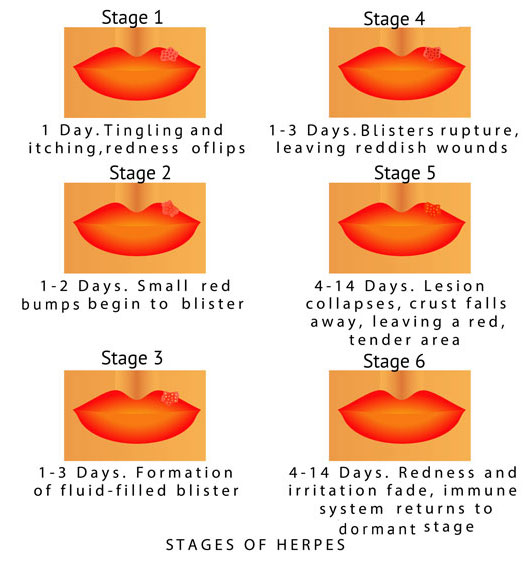How long after herpes outbreak is it safe?
Discovering that you have herpes, especially during a first outbreak, can be an emotionally challenging experience. Amid the physical discomfort and emotional turmoil, questions about when it's safe to resume sexual activity often arise.
The First Herpes Outbreak
A first herpes outbreak is typically the most severe, marked by the appearance of painful sores, flu-like symptoms, and emotional distress. The journey to recovery involves not only the physical healing of visible symptoms but also the management of potential psychological and emotional impacts.
The first outbreak poses a higher risk due to the greater concentration of the virus in sores. Even after lesions resolve, the person remains contagious. Prodrome signs, fatigue, fever, and chills precede visible symptoms, making infected individuals infectious during various stages.
Shedding was considerably higher among individuals with primary infection (17.2%) compared with those with nonprimary infection (6.9%). Long-term shedding was uncommon.
We know that up to 70% of new cases of herpes are transmitted from someone showing no apparent symptoms at the tim they infect their partner.
Research has shown that asymptomatic shedding occurs more frequently during the first year of having herpes than it does subsequently.
Shedding, and thus transmission risk, decrease rapidly during the first year after infection. However, HSV shedding still occurs and therefore viral transmission can still occur, particularly because shedding occurs predominantly in the absence of symptoms.
This information may present difficult emotional concerns about sexuality, and, unfortunately, there are no guarantees for fail-safe methods of dealing with this thorny issue.
2024 No.1 Herpes Dating Site

Concerned about herpes transmission and seeking a worry-free sexual experience? Meet nearby singles with HSV-2
The timing for resuming sexual activity after a first herpes outbreak can vary depending on several factors, including the severity of symptoms, the effectiveness of treatment, and individual healing rates.
Healing Time
How long does it take for a first herpes outbreak to heal? The duration of healing can vary, but for many people, it may take a few weeks for the sores to completely heal. Allow the sores and lesions from the initial outbreak to fully heal.

Keep in mind that everyone's body reacts differently to the virus, so the timeline may differ. Here are some general signs that may indicate the healing process is complete:
- Absence of Sores and Lesions: The primary indicator is the absence of visible sores or lesions in the genital or oral area. When the blisters or ulcers have healed, and the skin appears normal, it suggests that the acute phase of the outbreak has concluded.
- Resolution of Symptoms: Symptoms such as pain, itching, or burning sensations associated with the outbreak should subside. If you were experiencing flu-like symptoms during the initial outbreak, such as fever and fatigue, these should also resolve.
- Comfort during Daily Activities: You should be able to engage in daily activities without discomfort or pain in the affected area. If you can move, walk, or perform routine tasks without issues, it indicates that the healing process is progressing.
How long after the first herpes outbreak is it safe?
The timing for resuming sexual activity after a first-time herpes outbreak can vary from person to person.
Generally, it is recommended to wait until the sores have completely healed and any accompanying symptoms, such as pain or discomfort, have subsided.
You’re most likely to pass herpes to someone else when your outbreak first starts until seven days after your sores have completely healed.
You’ll know when your sores have completely healed when your skin is smooth and you can’t see the scabs anymore.
But it’s still totally possible to spread herpes even if you don’t have an outbreak. Using protection like condoms or dental dams during sex can help lower your chances of spreading herpes between outbreaks.
Taking antiviral medications, such as acyclovir, valacyclovir, or famciclovir, as prescribed by a healthcare professional can help reduce the frequency and severity of outbreaks. It may also lower the risk of transmission.

Concerned about herpes transmission and seeking a worry-free sexual experience? Connect with nearby people who also have HSV-2
Be absolutely honest about your herpes status
Keep in mind, herpes, while inconvenient, is not life-threatening. It may be bothersome, but it's not a catastrophic situation.
However, transparency is crucial, especially if your partner has a compromised immune system.
To foster a genuine relationship, complete honesty is essential. Informing your partner about your herpes status is a responsible and necessary step.
Open communication establishes trust and ensures that both individuals can make informed decisions about their health and the relationship.
While navigating such conversations may be challenging, being forthright from the beginning is key to building a foundation of trust and understanding.
Some people will reject you when they find out you have herpes. You may know this is not about being pretty enough, cool enough, smart enough, fun enough, or sexy enough.
It’s about intimacy and security and what people expect from relationships. You can’t always avoid that rejection. Lots of people with herpes also choose to join online herpes dating site / app and date other people with herpes.
You can connect with other people with herpes who understand the challenges of herpes without the need for explanations or justifications. There is less anxiety about disclosing your herpes status, as everyone on the site is aware of the commonality of the condition.
2024 No.1 Herpes Dating Site

Concerned about herpes transmission and seeking a worry-free sexual experience? Connect with nearby people who also have HSV-2